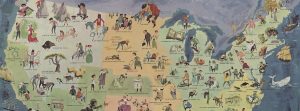You’ve heard the debate. Probably participated, as well. Is there a Great American Novel?
 Emily Temple, writing for Lit Hub, takes readers back to 1868 when John William DeForest “coined the now inescapable term ‘the great American novel’ in the title of an essay in The Nation—a term he defined as representing “the picture of the ordinary emotions and manners of American existence.” DeForest thought that the Great American Novel hadn’t been written yet, but since his early speculation there’s been no shortage of “contenders.”
Emily Temple, writing for Lit Hub, takes readers back to 1868 when John William DeForest “coined the now inescapable term ‘the great American novel’ in the title of an essay in The Nation—a term he defined as representing “the picture of the ordinary emotions and manners of American existence.” DeForest thought that the Great American Novel hadn’t been written yet, but since his early speculation there’s been no shortage of “contenders.”
Temple assembles a list of the usual suspects plus a few unique ones, among them (of course) John Updike’s Rabbit, Run (or rather, the collective Rabbit tetralogy). She blurbs each entry with a learned quote. For Updike it’s one from Troy Patterson written for Slate in 2009: “To consider the 1,700-odd pages of his Harry Angstrom saga—the bounding tetralogy of Rabbit books and their limping postscript—is to find yourself considering a work with an excellent claim as the Great American Novel, but you’d be forgiven for preferring to spend time with four or five Very Good ones.”
Other contenders on Temple’s non-exhaustive list are:
The Great Gatsby, F. Scott Fitzgerald
Moby-Dick, Herman Melville
To Kill a Mockingbird, Harper Lee
The Adventures of Huckleberry Finn, Mark Twain
Mason & Dixon, Thomas Pynchon
American Psycho, Bret Easton Ellis
The Grapes of Wrath, John Steinbeck
Underworld, Don DeLillo
Lolita, Vladimir Nabokov
U.S.A., John Dos Passos
Invisible Man, Ralph Ellison
Blood Meridian, Cormac McCarthy
Light in August, William Faulkner
Absalom, Absalom!, William Faulkner
Infinite Jest, David Foster Wallace
The Adventures of Augie March, Saul Bellow
Gentlemen Prefer Blondes, Anita Loos
Beloved, Toni Morrison
The Amazing Adventures of Kavalier and Clay, Michael Chabon
Freedom, Jonathan Franzen
The Brief Wondrous Life of Oscar Wao, Junot Díaz
These Dreams of You, Steve Erickson
The Flame Throwers, Rachel Kushner
